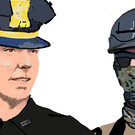We will adapt to the challenges of global warming or we’ll leave the job to some other species
As we approach Thanksgiving, we would be wise to remember that the Native Americans who existed in North America before European settlers arrived had long lived in harmony with the land. They had to. Their survival depended upon it.
In in his book, “The Day Before America,” William MacLeish tells the story of 18,000 years on our continent before Columbus arrived. In it, he looks at the dramatic shifts in climate and ecology that swept North America and how the native peoples adapted.
The Haudenosaunee, which the Europeans called Iroquois, who lived where we do now, were fierce hunters but also had a deep respect for deer and other animals that may have prevented overhunting, MacLeish writes.
Out west, early methods for killing bison were crude, such as setting fires to drive them off cliffs. But later hunters came up with ways to herd Buffalo on trails into corrals. When the bison population began to decline, hunters limited the number they killed.
Traditions and religious or spiritual beliefs of many tribes fostered the view that people were part of the natural world rather than its masters. The Haudenosaunee thought of living creatures — plants as well as animals — as possessing qualities of humanness and kinship. Hunters would be punished if they killed more than needed.
MacLeish writes that in the Middle Stone Age, which where we live began 10,000 years ago and ended about 3,000 years ago, was when Native Americans lived in closest harmony with their environment. Men hunted bear and elk while women collected berries and greens, opossums and rabbits. MacLeish terms this way of life “perhaps the most sustainable that humans have developed so far.”
Native American agricultural practices also showed environmental sensitivity. Animal shortages led to the creation of gardens. Four-thousand years ago, midwestern people used the cucurbit, a gourdlike vegetable, first as a tool and then developed into a variety of edible squash.
In the same time period, Anasazi natives in the arid region that is now called New Mexico responded to water shortages by constructing irrigation systems to sustain crops.
With the arrival of Europeans, vast forests were cleared and once-plentiful game was soon decimated. The industrial revolution that followed transformed not just the landscape and earlier ways of life but now, sadly, our very climate.
The most dramatic ecological changes in prehistoric America, by MacLeish’s telling, were not caused by human activity but by the ice age giving way to warmer temperatures 12,000 years ago.
What is happening now, though, is climate change caused partly by human creation.
Our current federal government has ignored the effects as we relentlessly destroy the Earth, heedless of future human generations, never mind plants or animals, with many species becoming extinct. Long-standing and successful protections for migratory birds and for endangered species are being withdrawn.
We’ve turned our backs on the Paris climate agreement, which represented the first time the world was set to come together to solve a problem that will hurt all of humankind.
Those who think such raping of the Earth is necessary for economic gain should read a recent analysis of the impacts of climate change on the United States economy that shows, for each degree Celsius increase in temperature, the country’s gross domestic product per year on average will decrease 1.2 percent.
The researchers, costing out the effects of climate change, conclude, “The combined value of market and nonmarket damage across analyzed sectors — agriculture, crime, coastal storms, energy, human mortality, and labor — increases quadratically in global mean temperature, costing roughly 1.2 % of gross domestic product per +1°C on average. Importantly, risk is distributed unequally across locations, generating a large transfer of value northward and westward that increases economic inequality. By the late 21st century, the poorest third of counties are projected to experience damages between 2 and 20 percent of county income (90 % chance) under business-as-usual emissions.”
Further, for those concerned solely with profits, climate change threatens portfolio losses of $4.2 million globally, or 3 percent of the current market capitalization of all the world’s stock markets through 2100.
That, of course, is not measuring the human toll that we see unfolding daily in news accounts — flooding, wildfires, drought, heat waves. These ever-more-frequent disasters take an economic toll as well as a human toll.
The most recent National Climate Assessment tells us climate on average has warmed about 1 degree Celsius since 1901 and failure to stabilize could result in warming of up to 5 degrees Celsius by the end of the century, with unthinkable consequences.
We must, as a society, take strong steps to reverse this path.
Historian Louis Warren wrote of America’s Native peoples, “Among other things, Indian history is a tale of constant innovation and change … If there is a single, characteristic Indian experience of the environment, perhaps it is the ability to change lifeways in radical fashion to maintain culture and identity.”
We could learn a lesson from the native peoples who changed and adapted through thousands of years of natural climate change on this continent. We have to evolve as human beings. This Thanksgiving, as we express gratitude for what we have, let us also think of what we have lost and of what we want to leave to future generations.



